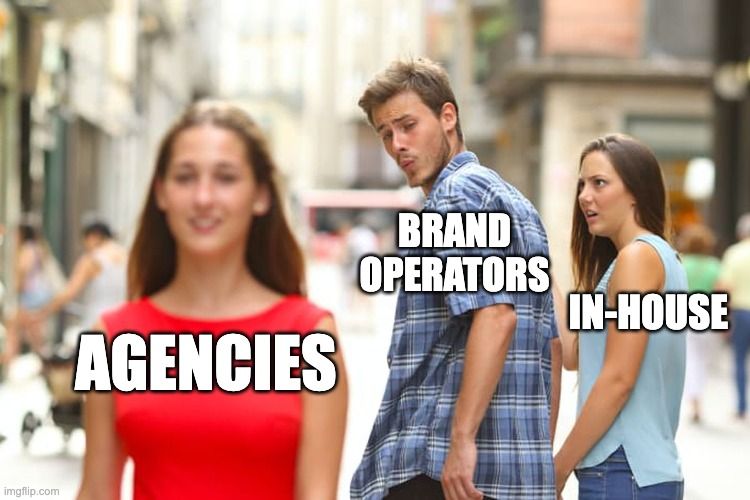I recently wrote an article voicing hesitation about the concept of sweeping Google Performance Max campaign best practices, and I wanted the chance to share a specific example of my pushback.
Specifically, the best practice suggested is to always, unequivocally, always exclude client brand terms from the Performance Max campaigns.
But... should you always exclude brand from PMax?
This may be the best practice that I hear most often touted online (specifically LinkedIn, and in private Slack channels), but is one I think may warrant closer examination.
My purpose in this post isn't to tell you NOT to exclude brand terms. It's just to help us ponder whether this best practice should always be applied, and to help us think more along the lines of "why or why not" as we continue to learn PPC.
I have two primary questions when considering whether someone should exclude brand from their campaigns.
1) What is the goal in excluding brand from PMax? What is this specific client hoping to accomplish?
2) Does excluding brand from PMax help you accomplish that goal?
Let's start by analyzing the nature of fully automated campaign types such as Performance Max. Due to the nature of Google's algorithms and access to a multitude of targeting signals we could never hope to see, PMax is designed to work most optimally with as much data as it can gobble up. PMax is a data monster. It wants whatever it can find, with unlimited budget, so it can eventually make the best decisions.
I think what this means, by default, is that we need a good reason to put constraints on PMax.
And there are good reasons.
The inability to pay Google's recommended daily budget is a good reason. Heck, access to funds is a great reason to put a constraint on your PMax campaign because you literally may not have the money to spend as much as Google wants you to spend on a daily basis!
As much as Google may be correct that eventually a PMax campaign in any vertical can figure out how to make it work with enough budget, if the business doesn't survive that learning period then it's kind of a failed campaign experiment... however correct of a path the algorithm was on! This is what daily budgets are for.
Another good reason to constrain the algorithm is to aim at the best audience by giving it ROAS targets. You may have margin reasons for wanting your PMax campaign to limit itself on who it is targeting. That will constrain the algorithm, but also ensure you're able to come up with the budget needed to set your daily budgets.
So some constraints, while limiting PMax's algorithms, are essential in communicating the proper business objectives to Google.

The reason I started with a discussion on algorithm constraints, is because I think we need to have an assumption that, if we're going to use PMax, it will typically do better when it is as unconstrained as possible... by default. So by default, I am geared towards giving PMax more data, UNLESS CONSTRAINING the algorithm will better communicate my business objectives to Google to help steer the algorithm in the right direction.
Or to put it another way, if you want more control, then don't use PMax.
Tracking with me?
Now, let's talk brand negatives. If we are making the assumption that we shouldn't constrain PMax unless it will be a helpful business objective corrective to Google, then I think it's crucial for every individual business to ask these questions themselves... which is why I don't think this is a sweeping best practice.
Remeber them from the beginning of this article? Those two questions are: What is the goal you'll accomplish by excluding brand negatives from PMax, and will excluding them actually accomplish that goal?
As I see it, there are many different stages of "brands" in the world and your objective with PPC brand targeting will likely differ according to where you are at.
Too often, I find those who suggest brand should always be excluded from PMax are thinking of a single type of brand out there in the world. This is the brand clearly at the "bottom" of the purchase intent funnel. These people may convert at an 18 ROAS while your non-brand generic terms convert at a 3 ROAS. This is good, because bottom of the funnel means they have already been marketed to, and you need a higher return on ad spend to account for the dollars already spent to get them to purchase. At that ROAS, those people would just have likely converted by direct, organic brand, Meta remarketing, or email... it's just a formality at this point. IN that case, segmenting them out is crucial, as you want to ensure you are distinguishing your bidding and ad creative between prospects still in the interest or awareness stages of the funnel with those who are simply clicking through to purchase, already decided.
Agreed. Exclude these people from PMax and manage them uniquely in Search Brand campaigns and in a query-filtered standard Shopping campaign!
But not all Brand searches are equal. Not all are bottom of the funnel, and therefore segmenting them out may not actually accomplish the same thing for some accounts.
If you've ever run an account for a large, household brand name who is marketing actively in numerous retailers (also in SERPs) as well as guarding against their own direct competitors, and who is so well known in their industry that their Brand has become synonymous with their product... then you know it's more complex than treating Brand terms as if they are solely bottom funnel.
In the above described example, your Brand term can actually be more in the Interest stage of the purchase funnel as people may type in your brand specifically to find who your direct competitors are so they can price compare. Those people aren't remotely in the "you own their souls-as-bottom-funnel-as-it-gets" so they shouldn't be treated as such.
In that case (especially with a lot of traffic and data), I think I can make an argument to leave brand in PMax to give a more full picture of the whole customer journey to the Google algorithm so it can make an even better decision. In that case, brand just really isn't acting differently than a solid mid-funnel keyword so might as well let Google do whatever Google wants. You don't really get anything by segmenting it out (unless you're gathering data, which is something you can gain by segmenting it into Search and Shopping... but then again, that fits your objective: to gather data, and isn't just a hard and fast rule).
I hope that has given some insight into why I think we need to be cautious about PMax best practices. At the very least, let's ponder this together and realize that each account may need to be treated differently based on your audience and business goals. Thankfully, that's why us PPCers are here. Death to Copy/Paste tactics, Life to individual account health!
What about you? Hit me up on Twitter or LinkedIn if you have additional thoughts to share.

.jpg)
.webp)


.jpeg)

.jpg)




